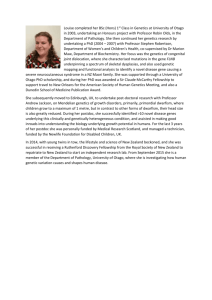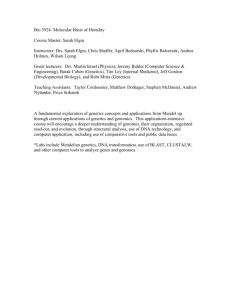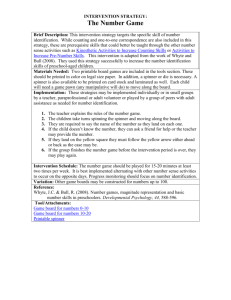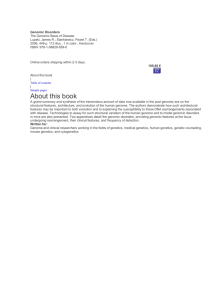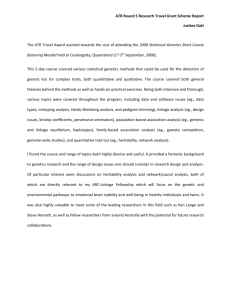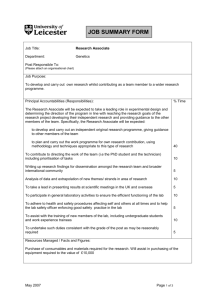CAMB 630 – Topics in Human Genetics and Disease
advertisement
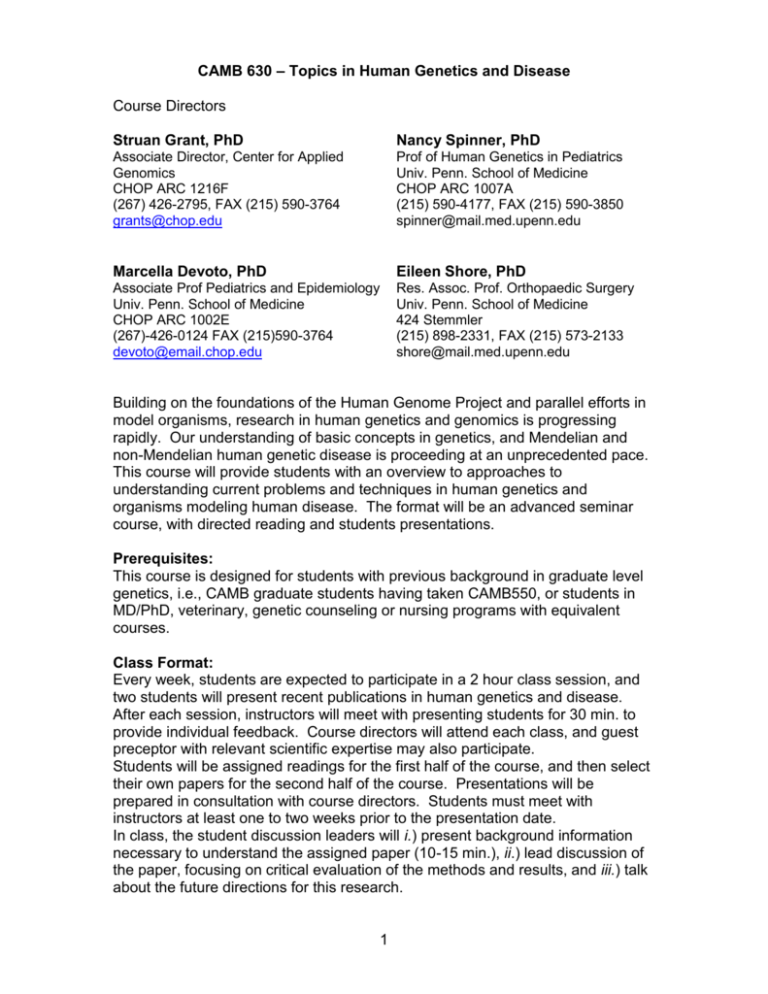
CAMB 630 – Topics in Human Genetics and Disease Course Directors Struan Grant, PhD Nancy Spinner, PhD Associate Director, Center for Applied Genomics CHOP ARC 1216F (267) 426-2795, FAX (215) 590-3764 grants@chop.edu Prof of Human Genetics in Pediatrics Univ. Penn. School of Medicine CHOP ARC 1007A (215) 590-4177, FAX (215) 590-3850 spinner@mail.med.upenn.edu Marcella Devoto, PhD Eileen Shore, PhD Associate Prof Pediatrics and Epidemiology Univ. Penn. School of Medicine CHOP ARC 1002E (267)-426-0124 FAX (215)590-3764 devoto@email.chop.edu Res. Assoc. Prof. Orthopaedic Surgery Univ. Penn. School of Medicine 424 Stemmler (215) 898-2331, FAX (215) 573-2133 shore@mail.med.upenn.edu Building on the foundations of the Human Genome Project and parallel efforts in model organisms, research in human genetics and genomics is progressing rapidly. Our understanding of basic concepts in genetics, and Mendelian and non-Mendelian human genetic disease is proceeding at an unprecedented pace. This course will provide students with an overview to approaches to understanding current problems and techniques in human genetics and organisms modeling human disease. The format will be an advanced seminar course, with directed reading and students presentations. Prerequisites: This course is designed for students with previous background in graduate level genetics, i.e., CAMB graduate students having taken CAMB550, or students in MD/PhD, veterinary, genetic counseling or nursing programs with equivalent courses. Class Format: Every week, students are expected to participate in a 2 hour class session, and two students will present recent publications in human genetics and disease. After each session, instructors will meet with presenting students for 30 min. to provide individual feedback. Course directors will attend each class, and guest preceptor with relevant scientific expertise may also participate. Students will be assigned readings for the first half of the course, and then select their own papers for the second half of the course. Presentations will be prepared in consultation with course directors. Students must meet with instructors at least one to two weeks prior to the presentation date. In class, the student discussion leaders will i.) present background information necessary to understand the assigned paper (10-15 min.), ii.) lead discussion of the paper, focusing on critical evaluation of the methods and results, and iii.) talk about the future directions for this research. 1 CAMB 630 – Topics in Human Genetics and Disease A short written assignment will be due by the end of the course. This written work will be in the form of a review piece or “news and views” format commonly seen in scientific journals. The topic of this review can be based on one of the two topics the student presents in class, or on a separate topic approved by the instructors. The review should be approximately 1,000 words or less (no more than 4 double-spaced pages). Minimum number of students 10, maximum 20. Fall semester, Thurs. 1:30-3:30 PM. Grading: Students will be evaluated based on class participation (25%), their first presentation (25%), their second presentation (25%), and the written assignment (25%). Topics in Human Genetics and Disease: I. Genome architecture and instability (Spinner) Chromosome specific repeats/segmental duplications Genomic rearrangements Telomeric and subtelomeric repeats Copy number variation II. Mutations in Human Disease (Spinner, Shore) Novel molecular mechanisms Modifiers of Mendelian disease Developmental pathways and genetic disease III. Human genomic variation and disease (Devoto) History and substructure of the human population Allele frequency differences between populations and disease susceptibility Common complex disease IV. Epigenetics and transcriptional regulation (Shore, Grant) Imprinted disease Chromatin structure disease Mitochondrial disease Acquired epigenetic disease Long-range regulatory elements X-chromosome inactivation V. Emerging Technologies (Grant) Sequence analysis SNP Chips 2 CAMB 630 – Topics in Human Genetics and Disease Methylation analysis Analysis of gene function and transcriptional regulation Systems biology Schedule for Topics in Human Genetics (Thursdays, 1:30-3:30pm, BRB 1201, Fall Semester 2010) Date Topic and paper 09/16/10 Introductory meeting Instructors ALL Outlining expectations Slide prep guidelines 09/23/10 I. Genome architecture and instability Spinner 09/30/10 II. Human genomic variation and disease Devoto 10/14/10 III. Mutations in human disease Spinner, Shore 10/21/10 IV. Epigenetics and transcriptional regulation Shore, Grant 10/28/10 V. Emerging Technologies Grant Deadline for selection of papers for student presentations 11/04/10 ASHG meeting, no class 11/11/10 I. Genomic architecture and human disease Student selected paper 11/18/10 II. Human genomic variation and disease Student selected paper 11/25/10 Thanksgiving holiday, no class Spinner 12/02/10 III. Mutations in human disease Student selected paper Spinner, Shore 12/09/10 IV. Epigenetics and transcriptional regulation V. Emerging Technologies Student selected papers Shore, Grant 3 Devoto


